Mistakes Everyone Makes With Vodka
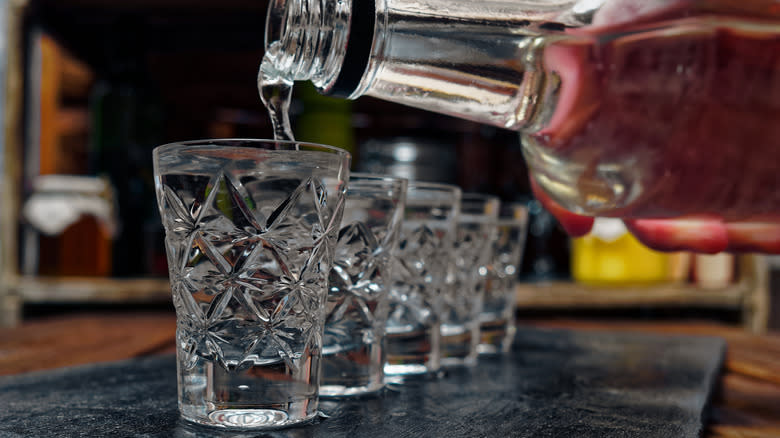
Vodka is a spirit that divides opinions. Some people won't touch it after drinking a cheap hairspray-tasting bottle or getting sick on screwdrivers in their younger years. Others see it as a classic cocktail ingredient that deserves a place in every liquor cabinet. But, there are some mistakes everyone makes with vodka. If you're generally a vodka-avoider, learning the missteps to avoid could turn your relationship around. If you love the stuff, you might improve your drinks and find some new things to do with this spirit.
While vodka is used in drinks more often than it is in food, it can also be a great ingredient to cook or bake with. So we wanted to cover mistakes with both using it in drinks and cooking with it. From not knowing when to use cheap bottles (and when to break out the top-shelf stuff) to using too much vodka in recipes, there are so many errors people can make — but just as many ways to fix or avoid them.
But don't just take our word for it. We spoke to three food and drink experts: a vodka brand founder, a cocktail expert, and a food blogger who regularly cooks with the spirit. Armed with their hot takes, we're about to demystify common vodka myths and mistakes and help you avoid these frequent pitfalls.
Read more: Popular Vodka Brands Ranked From Worst To Best
Using Cheap Vodka When It Matters
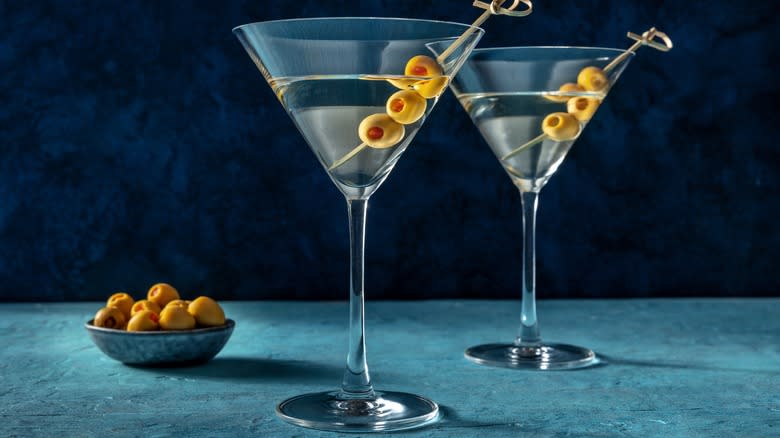
If you've decided that all vodka tastes like kerosene, maybe you've been drinking the cheap stuff. While this spirit is meant to have a neutral taste, the very cheapest versions are unpleasantly bitter and have an aroma reminiscent of paint thinner. Not all affordable bottles are this bad, but there's a time and a place for it — and sometimes using cheap vodka is a big mistake.
Some people wonder if there's really much difference between cheap and expensive brands. "If it's a martini or something where you can taste the vodka, I think there's definitely a difference," says Mia Crusto, general manager and cocktail expert at ROOF on theWit in Chicago. Andy Pitts, owner and curator of Lord Vodka agrees — "for martinis, high-quality vodka enhances the experience significantly," he notes.
What you're going to be using it for makes a difference as to whether you should go cheap or expensive. "I love Tito's as an overall go-to — but for a martini, I like Grey Goose or Ciroc because I think they are a bit smoother," Crusto remarks. Of course, there are other drinks where vodka is prominent, but if a brand is high-end enough to taste good in a martini recipe, it'll work nicely in other vodka-heavy drinks. As for cooking, with "savory pan sauces and macerating fruit, use a vodka you like to sip because the clean notes and bite will be more noticeable," says Lisa Lotts of Garlic and Zest.
Using Expensive Vodka For Everything
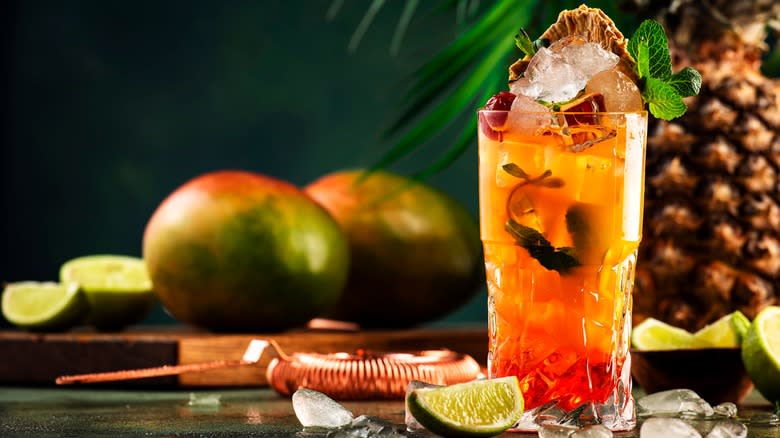
In some cases, you really don't need expensive vodka. We're not suggesting you get the cheapest, nastiest bottle, because those hairspray vibes will come through. But a solid bottom-shelf option is sometimes what a drink or recipe calls for.
"When choosing a vodka to cook with, I don't go with anything super expensive," Lisa Lotts remarks. "A moderately priced 80-proof vodka will work for most cooking applications." Anything top-shelf is likely to get lost in the mix in most recipes. "For baked goods or fry batter, a less expensive bottle is fine, as the recipes won't require much, and those styles of recipes use vodka for different reasons: to create light coatings and flaky textures or crusts," Lotts continues.
As for drinks, Mia Crusto explains there's a time and place for affordable vodka. "If you're putting it in a punch or something else, it's totally fine to go with something cheaper! You're probably not going to notice the difference too much there." So, think about how prominent the vodka is in a cocktail recipe or mixed drink. If it contains a number of other liquors or a lot of juice, soda, or other ingredients, quality is less of an issue. An expensive bottle will just be a waste.
Assuming More Expensive Vodka Is Always Better
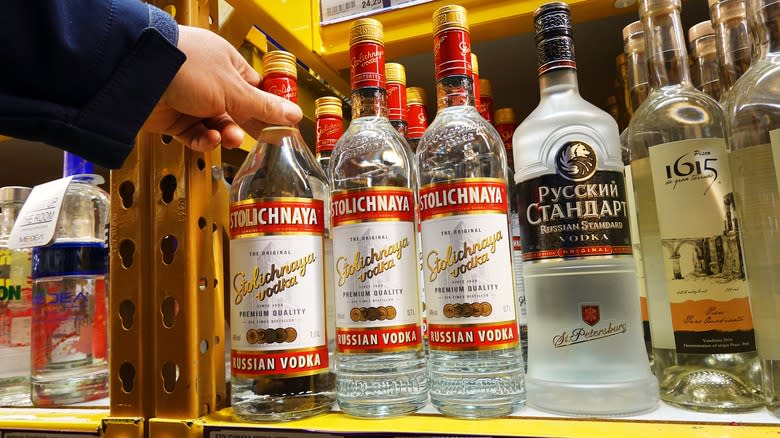
A common mistake folks make when buying vodka is assuming that the more expensive it is, the better it will be. "Quality doesn't always correlate with price," notes Andy Pitts. Sure, there is some link between price and quality, but it isn't as simple as saying that if a bottle costs more, it will definitely be better.
For example, you'll occasionally get a bottle for $25 that you prefer to a $50 one. And "prefer" is a key word here. When it comes to food and drink, there's always an element of preference. What some people love, others hate. So you may have to shop around and try a few duds before you find a brand you love. Don't believe that an expensive spirit is sure to be amazing; judge a vodka by price alone and you might be disappointed.
So how should you make sure you get a vodka that's worth the money? "Prioritize research, ask to sample, and don't fixate solely on price when selecting vodka," suggests Pitts. If you go to a reputable liquor store, you may be able to get recommendations from staff or try out samples.
Not Understanding The Different Ingredients Vodka Can Be Distilled From
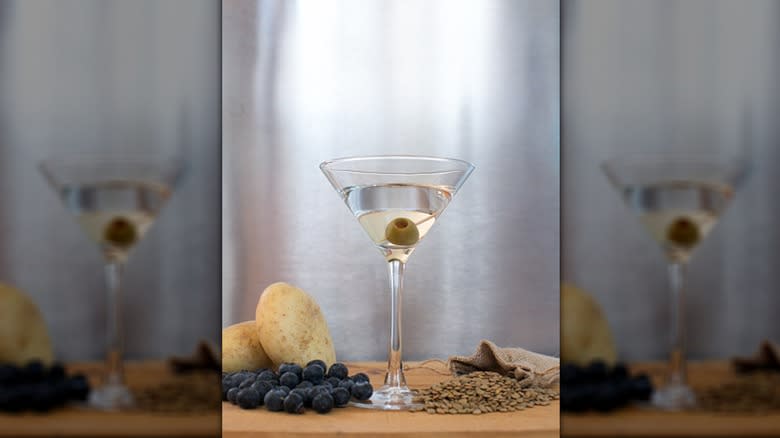
Some people think that all vodka is made from grains. Others think it's made from potatoes. Well, both of these are correct — and more. But, not understanding the difference that these base ingredients can make is a mistake. Sometimes there's an obvious difference and other times it's down to preference. But once you figure out what you like, it'll be easier to find a bottle you love.
According to Andy Pitts, "When vodka is distilled from grains like corn, you'll likely feel a distinct mouth feel or burn, inherent to the grain despite filtration efforts." He suggests opting for wheat or potato-based varieties as these don't burn in the same way. But Mia Crusto insists it's more about preference. "If you're trying something new, I would say try to find the actual fruit or vegetable it's distilled from to help make your choice," she says. "Grey Goose comes from grapes, Tito's is from corn. Go with what you like!"
So, what are your options? Vodka can be made from all kinds of grains. Those made from wheat may have zesty notes and a slight aniseed flavor. Rye-based vodka has a nutty sweetness, with some notes similar to rye bread. This spirit can also be made from various fruits, but grapes are the most common, giving subtle lemon zest flavors. Potatoes are a common base for Russian and Eastern European vodkas. They give a full flavor and creamy texture.
Using Too Much Vodka When Cooking With It
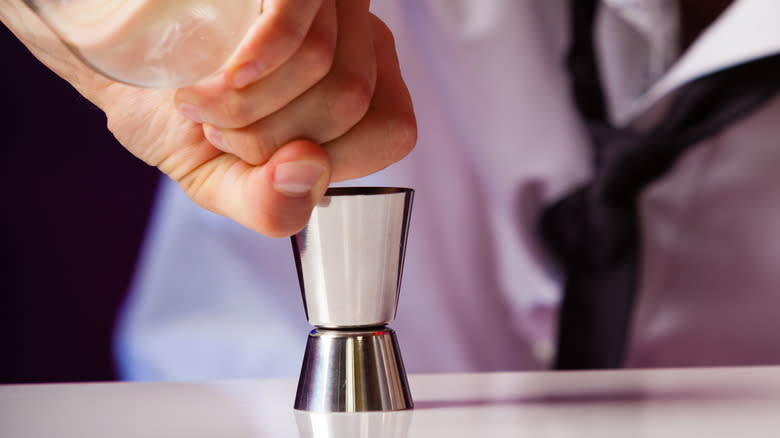
What sometimes puts people off cooking with vodka is the notion that it might leave food with an intensely alcoholic flavor. However, when used correctly, it shouldn't do this. The trouble is when it's used excessively. Vodka has a neutral flavor and shouldn't add too much to a recipe. Rather, it should "enhance the flavors already present in a dish," explains Lisa Lotts.
If you're new to cooking with this spirit, you should try an existing recipe that uses vodka, rather than experimenting and throwing some in whatever you're cooking. As long as you stick to the recipe, it should contain the perfect balance of ingredients. "For most recipes, I recommend measuring the spirits instead of pouring them directly from the bottle to ensure you're not overdoing it," advises Lotts.
Once you're feeling more confident, you might choose to go your own way, adapting recipes you're already familiar with to include vodka. But how much should you use? Lotts says "⅓ to ½ cup should be ample for braises, but 2-3 additional tablespoons won't hurt." Beyond that, just start out conservatively, adding more a little at a time until you're happy with the results.
Cooking With Overproof Vodka
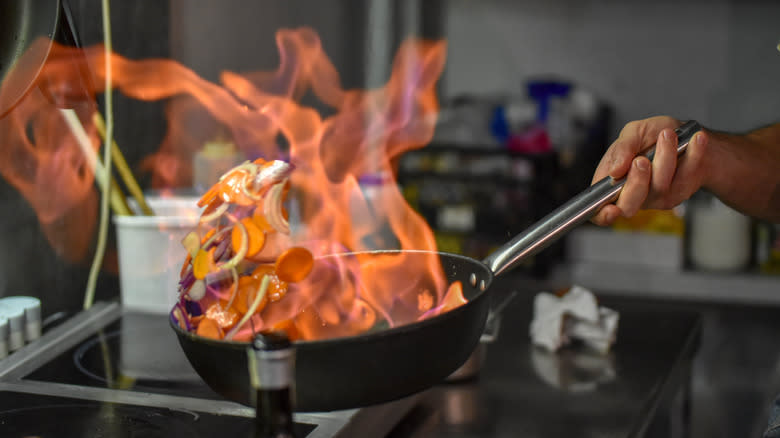
Cooking with overproof vodka (that's 100 proof or higher) can be a mistake — depending on what you're cooking and which methods you're using. If you're planning on flambéing, it's especially important that the spirit you choose isn't too strong. Lisa Lotts recommends using an 80 proof vodka. She explains that this "means it has more water than alcohol and won't hold a flame as long, so it's safer for a flambé."
While it isn't unsafe to use overproof vodka for other purposes, there are a couple of reasons why you might not want to. First, overproof spirits have more of a kick to them. This might be great in certain cocktails or when you want to get merry, but you probably don't want an overly alcoholic sauce or too much of that punchy vodka bitterness. The other is that overproof alcohol often costs more. If you're planning to cook off most of the booze in a recipe, there's not much point in wasting the strong stuff. Use something less alcoholic. You'll save some money and may end up with a better-tasting dish.
Not Expanding Your Repertoire Beyond Penne Alla Vodka
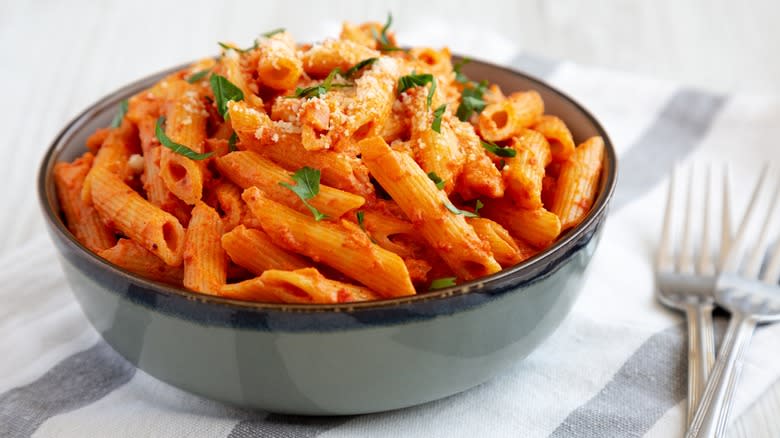
Most keen cooks have heard of penne alla vodka. While there's no argument from us that this is a great dish, it's not the only thing you can make with this popular spirit. If it's the only thing you've ever considered cooking with vodka, you're making a mistake. There are plenty of good reasons why you should be cooking with vodka — and there are so many great dishes you can cook with it.
Other dishes with vodka you might want to try include Bloody Mary soup, martini cheese dip, bruschetta, vodka grilled corn, and baked beans. There are also various pasta recipes that use vodka in their sauces but go beyond a standard penne alla vodka.
You can also experiment by adapting recipes that use other types of alcohol. "I like to use vodka in any recipe I'd normally add wine or vermouth or as a substitute for water when deglazing a pan," says Lisa Lotts. "For instance, use about ¼ cup of spirits after searing chicken breasts or pork chops to loosen the browned bits, and scrape them up with a wooden spoon. Season with fresh herbs, a little Dijon mustard, and a pat of butter for a savory pan sauce."
Not Realizing Vodka's Potential In Sweet Dishes
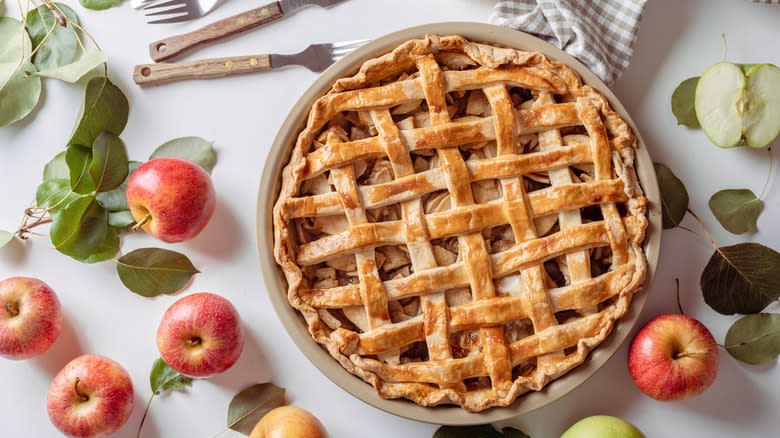
Haven't thought about using vodka in desserts and other sweet recipes? Then you're making a mistake. This spirit can be useful in a range of sweet applications, even when you aren't supposed to taste it in the finished dish. Lisa Lotts uses it in a range of recipes and has shared her wisdom with us.
Adding a little vodka to pie crust "is a secret chef's trick," she says. "It puffs and evaporates as the crust bakes, leaving perfectly flaky layers." But that's not it for baking with vodka. "Shortbread cookies benefit from one to two tablespoons of vodka," Lotts explains. She notes that it creates a dough that's softer and more workable. If you're worried that your shortbread might taste too much of booze, it shouldn't be an issue. "Much of the alcohol should evaporate during baking and leave you with light, crunchy, melt-on-your-tongue buttery shortbread," remarks Lotts.
She also used it to create a no-churn ice cream. Usually, when you make ice cream from scratch, you need an ice cream maker or strong arms for churning by hand. But adding vodka to an ice cream base can "prevent the gritty, icy granules that sometimes form with homemade ice creams," she notes. Lotts has one last great tip for sweet recipes — "I preserve fruit in vodka because it inhibits bacterial growth and makes fruit boozy and delicious."
Failing To Let The Vodka Cook Off
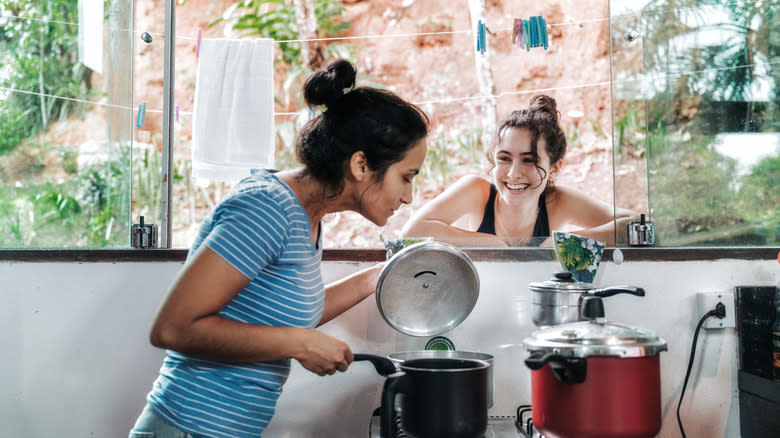
One common mistake people make when cooking with vodka is not letting it cook off adequately. If you've made penne alla vodka or another recipe with this spirit that's ended up tasting like it's just come back from a long night at the bar, you probably made this error. Without adequate time to let the alcohol evaporate, you might be left with an unpleasant flavor and too much of a harsh kick to your finished dish.
So how do you make sure that you've cooked off the alcohol enough that your dish will taste great? Well, you should simmer it for a while or cook it quickly at a high heat — for instance, using the flambéing technique. If in doubt, follow the recipe and it should give the dish enough simmering time for the flavors to meld and the harsh vodka flavor to subside.
It's worth noting that cooking off the alcohol in a dish doesn't completely get rid of its alcohol content. It still has around 40% of its original alcohol content after simmering for 15 minutes and around 25% of its original alcohol content if it has simmered for an hour. So bear this in mind when serving dishes to children or anyone who avoids alcohol.
Marinating Proteins In Vodka For Too Long
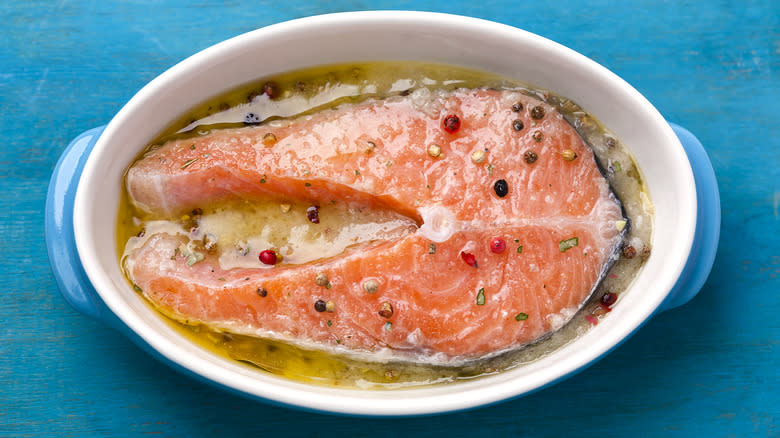
According to Lisa Lotts, you can use vodka in marinades to enhance the flavors in a dish. However, she points out a common mistake — marinating proteins in it for too long. The problem isn't with the flavor (although a long soaking could lead to an overly boozy dish), but rather with textures.
"If it soaks too long, it can affect the texture of some proteins," says Lotts. She notes that "20 to 30 minutes is usually enough for chicken or pork, and 10 to 15 minutes will be plenty for seafood." So if you're used to letting ingredients soak up that flavorful goodness for a few hours or overnight, you will need to adjust your usual methods.
If you want the other flavors in your marinade to take center stage, let the protein steep in the other marinade ingredients overnight or at least for a few hours, then add the vodka in the last 10 to 30 minutes. This way, you get the benefit of a long marination without an excessive punch of vodka flavor or altered texture to your protein.
Using Vodka At The Wrong Temperature
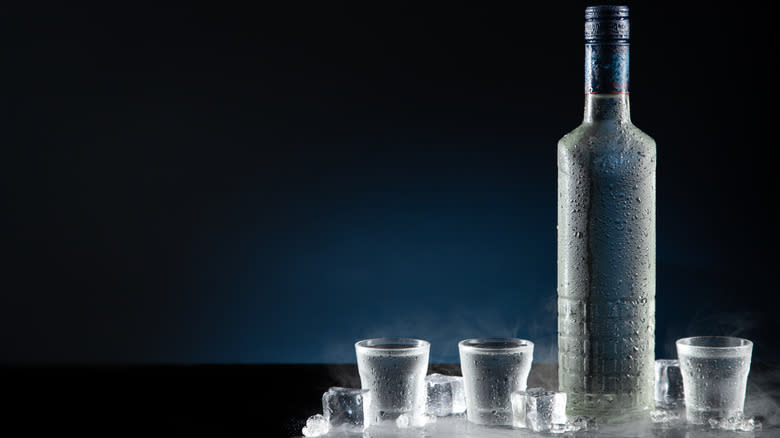
People commonly use vodka at the wrong temperature. But the right temperature depends on what you're using it for. So you need to think about your requirements. Generally speaking, chilling your vodka is unnecessary. "You do not need to store it in the freezer unless you're taking shots and want it cold with no dilution," notes Mia Crusto. She explains why room temperature is better for martinis, even when you like them cold — "If you're shaking it in a martini, it's going to get cold but add some dilution from the ice melting, which gives a martini that signature taste."
But when it comes to pastry, things are different. A trick from Lisa Lotts "for a flaky pie crust" is adding a few tablespoons of cold vodka. "It must be cold," she stresses. This is part of what helps it puff up and create flakiness. Use room-temperature vodka here and you just won't get the same results.
So usually, room temperature is the way to go, unless you're taking shots or making pastry. But Andy Pitts has his own advice. "Refrigerating or freezing it is a matter of preference," he says. "Especially when it's cocktail time." He believes that colder vodka can reduce the slight burn that some vodkas give when you drink them straight or use them heavily in a dish.
Being Too Picky With Brands

When you're drinking at a bar, Mia Crusto says that "being too picky when it comes to vodka is a common mistake." You might have favorite vodka brands, but the mixologists who put the menu together know what they're doing. "If a restaurant or bar uses Belvedere in a cocktail versus Grey Goose, there might be a reason," Crusto remarks. "Don't assume that it will taste better if you swap it out for one of your go-to vodkas. Trust the bar and the curation of the menu!"
The same is true when you're following cocktail recipes at home. If there's no brand of vodka specified, fine — go with whatever you like best. But if the person writing the recipe calls for a precise brand, there's probably a good reason. Perhaps the notes of that particular bottle work especially well in that cocktail. That said, if the recipe in question was written or sponsored by a vodka brand and recommends using its liquor, then it's fine to be more skeptical and use whatever vodka you have on hand.
Read the original article on Mashed

